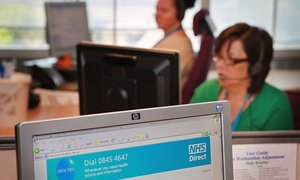 The NHS is never short of projects aiming to bring innovation into and across the organization. The latest of these is the Entrepreneur Training Programme, which aims to provide 85 clinicians with mentoring from the likes of Microsoft and Verily.
The NHS is never short of projects aiming to bring innovation into and across the organization. The latest of these is the Entrepreneur Training Programme, which aims to provide 85 clinicians with mentoring from the likes of Microsoft and Verily.
One of these is Chris Wittle, the founder of telehealth startup MyMed. Telehealth is a subject I've written about a lot in recent years, with startups such as Babylon and Vida leading the way in their delivery, whilst Medigo have attempted to use telehealth to provide top notch healthcare to those in third world countries.
Inside the NHS, the rollout of telehealth has largely been confined to trials in places like Airedale NHS trust, which installed a telehealth system in a care home for the elderly, thus providing residents with 24/7 care.
When the system was tested out, it saw a 35% reduction in emergency admissions and a 53% drop in A&E attendance.
These gains were reflected in a study conducted by a team from UC Davis, which explored the cost savings possible with telehealth. It reveals that such savings are particularly pronounced in rural areas that use telemedicine to connect up emergency departments with doctors at much larger hospitals. It suggests that even once the costs of installation and maintenance are considered, the savings work out at around $4,662 per use on average.
"Our previous work showed that telemedicine was good for kids, families, and providers, but we didn't really address the cost issue," the authors say. "Now we know, not only does it improve quality, safety, and satisfaction, but it also saves money."
Changing habits
Of course, to obtain those kind of benefits will require a shift in behavior, from both patient and doctor alike. This may be a sizeable challenge, at least according to a recent paper from researchers from the Universities of Bristol, Oxford, Edinburgh and Exeter.
The study, which the authors claim is the first of its kind on the UK, set out to examine the extent to which general practices teams in the UK were taking advantage of new platforms to offer their services, either now or in the future.
Over 400 practices were chosen, with a combination or urban and rural, deprived and affluent locations selected to try and provide a good cross-section of the country.
"We found that, despite the majority of practices offering telephone consultations on a frequent basis (66 per cent), fewer were implementing email consultations (6 per cent) and none were currently using internet video. In addition, the majority do not plan to implement these methods in the future," the authors say.
Build and they shall come
It's a problem that leading telehealth provider Babylon aren't facing. Their industry leading platform has had no such difficulties attracting doctors to both sign-up and use the platform in large numbers.
I met up with founder Ali Parsa at the recent unveiling of a new AI based triage service that aims to make it easier and more effective for patients to take those first steps towards good health. The service was tested both live against experienced doctors and nurses on the day and over a more prolonged period and featured strongly on both occasions. Indeed, the AI system was found to be both more accurate and considerably faster (and therefore cheaper) than human based triage services.
Parsa suggested that if these kind of services can be provided then patients will flock to use them, which in turn will get the doctors on board. The challenge, therefore is to build telehealth platforms that are good enough to entice customers and the rest will naturally fall into place.
Babylon are already working with a couple of NHS trusts, as well as a large number of corporate clients, so hopefully we may soon be heralding an age of telehealth in the NHS.
